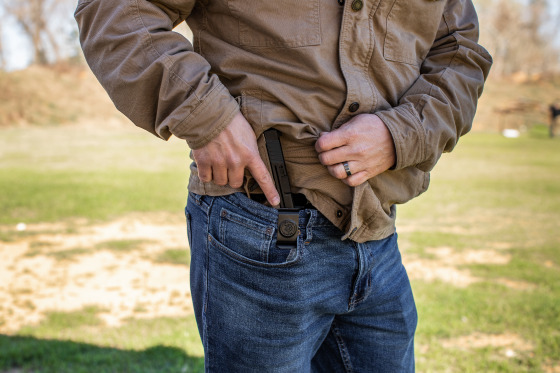
There are at least five conceal carry considerations every handgun owner needs to make. Many preppers know the advantage of having a reliable do it all rifle like the AR15 that can serve as a truck, home defense, and hunting gun. What may not be readily apparent to some, is that there an infinite number of scenarios where it pays to have a concealed firearm on your person. Of course, this is not possible for everyone, but concealed carry remains one of the best ways to be prepared. So it may be worth learning about how to conceal carry a full size handgun.
While many states in the country allow constitutional open carry, which means you can legally holster a full-sized handgun on your hip, most self-defense experts agree that this can cause you to become a target or be viewed as a threat rather than being the good Samaritan stopping the threat.
Besides that, the element of surprise can be the most important element in any combat situation.
Although having a weapon on your person may give you a peaceful sense of well-being, just remember that you should be well trained and of course don’t conceal carry if you’re forbidden by law from doing so, for any reason.
Conceal Carry Considerations
Full-Size vs Compact Handguns
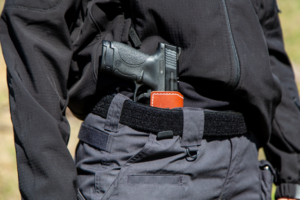
Full-Size
Some concealed carriers prefer a larger pistol instead of compact and subcompact pistols that supposedly are the perfect answer for concealed carry. There are a few good reasons for carrying a full-sized firearm, but it does present a few obstacles most gun owners will need to overcome.
First, you should understand the benefits of a full-sized pistol, and then you need to practice a few carry options that will keep that pistol in place and hidden from public view.
One of the first benefits of a full-sized gun is a larger magazine capacity. Most compact or subcompact pistols, even those with a double stack configuration, offer fewer rounds than a full-sized gun with a fourteen or fifteen-plus-round magazine.
Remember that if the micro-pistol you choose is small enough to conceal easily, its magazine will be small, and the amount of ammunition the gun will hold is limited. Another thing to consider is that all hands are not the same size.
Those gun owners with larger hands attempting to handle a smaller pistol typically end up fumbling awkwardly from the moment the gun is deployed, through the firing sequence, and during reholstering the weapon.
Handling a full-sized concealed carry handgun with much larger hands guarantees a more comfortable experience from the deployment, firing, and reholstering. Conversely, attempting to draw and fire a full-sized handgun will often produce the same difficulties for those with smaller-sized hands.
Bigger magazine capacity notwithstanding, a full-sized pistol also offers a much longer sighting radius which means better target acquisition and more accurate shots.
Compact and Sub Compact
Not withstanding the greater magazine capacity and easier to grip frame of certain full-size handguns, the market is also getting better at making more concealable pistols that still offer plenty of capacity.
We would be remiss if we didn’t mention some of the compact newcomers like the 9mm, Sig P-320 that offers a 15 round capacity which is the same as a full size Gen3 Glock 19! The 9mm micro-compact Springfield Hellcat also comes to mind, with an astonishing 13+1 capacity.
However, as a general rule, most full-size handguns will hold more rounds, be easier to grip for bigger hands, and be more accurate because of their longer barrels. In a SHTF scenario, full-size handguns are preferred.
But compact and sub-compact handguns offer the advantage of being easier to carry or store, plus if you shop around, you can find models that have a decent capacity. Plus, if the situation rules out the practicality of carrying a full-size gun, then a compact or sub-compact handgun ensures that you still can defend yourself. It is also at this point that we must mention, one is none, so some people will carry a full-size gun and a compact gun as a back-up.
Weather Often Dictates the Carry
If you’ve decided that if a full-sized firearm is what you want to carry, understand that the weather typically defines what you wear and the type of holster and holster position to use for a successful concealed carry.
Being in a cold weather environment makes it easier to hide that bigger firearm from plain view underneath your layers or winter coat. Of course, you need to work out how you’re going to access it if the need arises. If you’re running a compact handgun, then make sure it doesn’t get lost in your layers of clothing.
If you’re in a hotter environment, then you may still carry a full-size handgun, but you’ll probably have to get creative about concealment. Some users wear baggier t-shirts and even dress shirts in combination with a waistband holster.
Smaller handgun carriers will be more comfortable not lugging around that bigger holster when it’s hot and have an easier time concealing even if they’re just wearing a tee-shirt.
No matter what size your handgun, what the weather is, and what you’re wearing you will have to practice your draw.
And nothing is more important to successfully carrying a handgun than finding the right holster.
The Right Holster for You
After wear-testing and picking the best winter and summer wear that will properly conceal your pistol, you’ll need to consider purchasing an IWB or inside waistband appendix holster.
Holsters from companies such as We The People, IWB holsters, Alien Gear, or Urban Carry holsters make it easy to carry a full-sized pistol regardless of your body type and size.
Another great feature of these types of appendix holsters is that your full-sized pistol or compact pistol can be successfully concealed even in the summertime without needing a specialized shirt or jacket.
Many of these appendix holsters also offer a slight cant, which minimizes the amount of grip exposure you’ll need to conceal when worn inside the belt.
A Good Belt Makes the Difference
Wearing a quality belt with your appendix holster is typically the last thing on someone’s mind regarding concealed carry of a full-sized gun.
Not only should the belt you choose perform the obvious of keeping your pants on your hips, but you need to pick one that’s strong and rigid enough to support the added weight of a pistol.
The belt also needs to be stiff and sturdy enough to prevent your holster from twisting or sagging to a position that makes it difficult to grip and withdraw your pistol instantly.
Something to consider is that wearing something such as a Tactical World Store tactical duty belt defeats the purpose of concealed carry.
For less than fifty dollars, Galls Gear offers a Sam Browne duty belt that comes with either brass or silver hardware and three different colors or finishes.
As appearances go, the Galls Leather Gear duty belt resembles an everyday belt choice, fits comfortably and offers superior support for your selection of an appendix holster without buckling.
Having the right belt on your hips means a more comfortable and dependable fit which ensures all-day concealed carry without chafe or irritation and still allows a reliable draw and instinctive reholster without the need to fumble around.
Lastly, if you do not wear a belt regularly, a compact or subcompact gun handgun may better fit you. There are pocket holsters, sticky holsters, and (for women) the Flashbang holsters, allowing safe concealed carrying without a belt.
Conceal Carry Positions
This YouTube video was made by USCCA. Check out some of their other informative videos here and don’t forget to subscribe!
Putting It All Together – Conceal Carry Gun Considerations
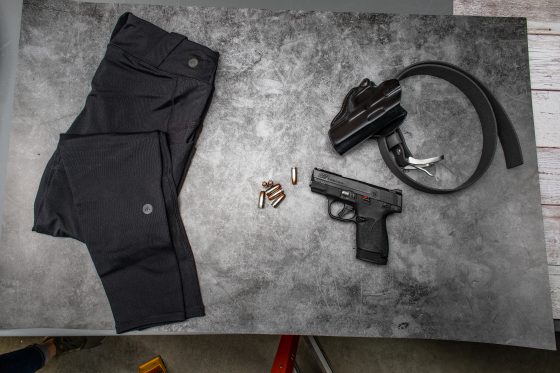
As you’ve probably realized by now, there are only a few differences between concealed carry of a compact or subcompact gun versus a full-sized pistol.
With the correct type of holster and belt, picking out a few winter and summer wear selections, and choosing the proper placement, anyone can successfully carry.
While it may take a little time and a few trial runs with various holster types and belts or clothing, you’ll be able to find the right mix that works well for you.
Depending on the weather conditions, you may want to consider selecting more than one full-sized concealed carry option.
With the bargain prices of clothing and equipment on the market, it’s not uncommon to have an outside waistband hip carry during the winter months when concealment is much easier with a coat or jacket.
Additionally, during spring and summer, an IWB or inside the waistband appendix holster and lightweight and breathable clothing will keep you cool and comfortable, and your pistol effectively concealed.
Related Article: 6 Places to Conceal a Knife
Thanks for visiting Preppers Survive. Before you leave subscribe to our newsletter. If you enjoyed this article Conceal Carry Considerations, please share it on your favorite social media.
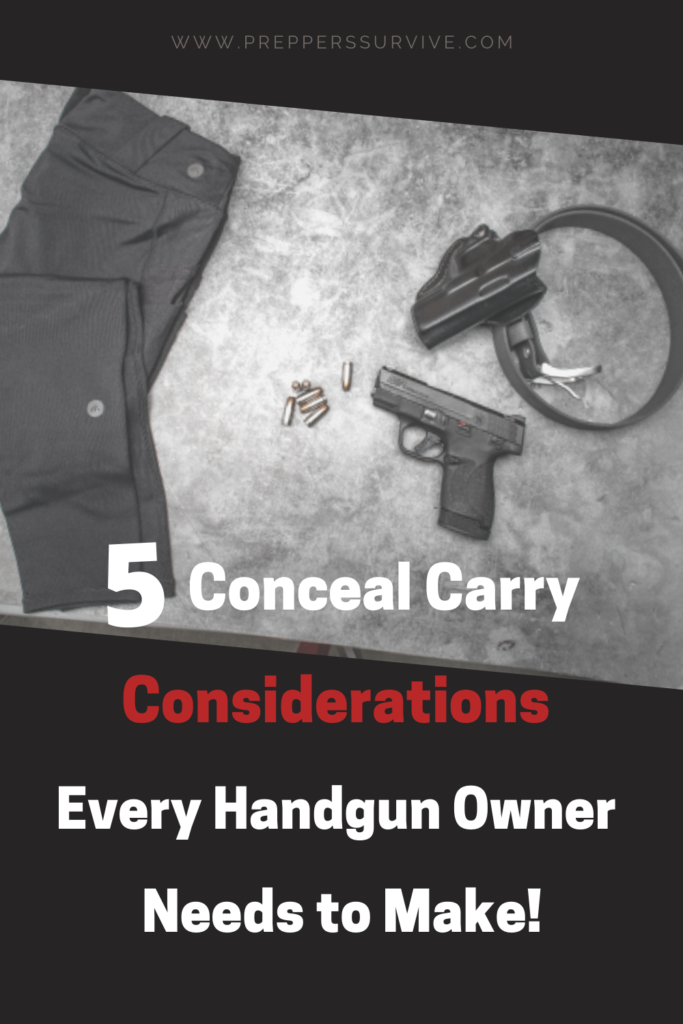


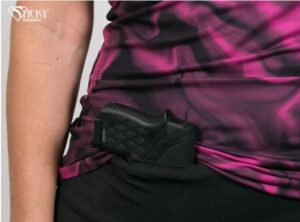
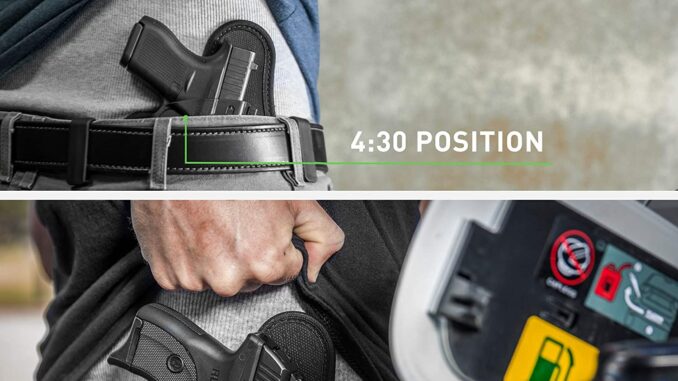


Leave a Reply